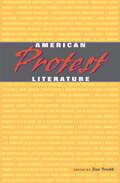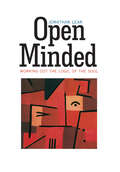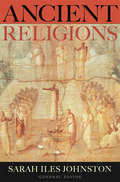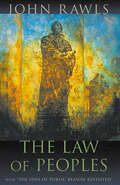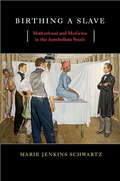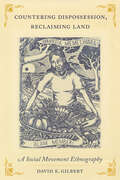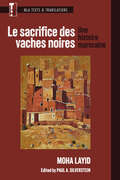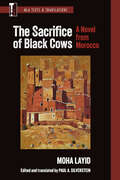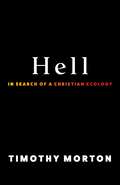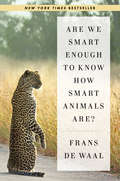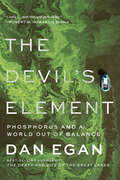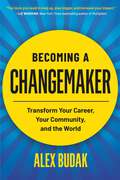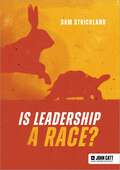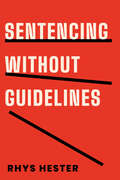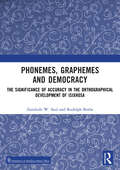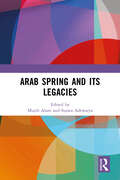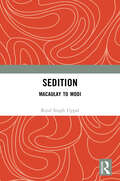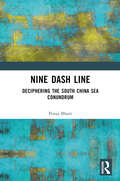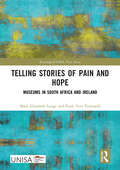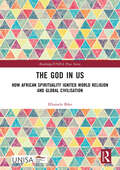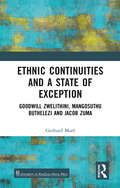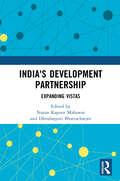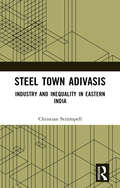- Table View
- List View
American Protest Literature (The John Harvard library #99)
by Howard Zinn“I like a little rebellion now and then”—so wrote Thomas Jefferson to Abigail Adams, enlisting in a tradition that throughout American history has led writers to rage and reason, prophesy and provoke. This is the first anthology to collect and examine an American literature that holds the nation to its highest ideals, castigating it when it falls short and pointing the way to a better collective future.American Protest Literature presents sources from eleven protest movements—political, social, and cultural—from the Revolution to abolition to gay rights to antiwar protest. Each section reprints documents from the original phase of the movement as well as evidence of its legacy in later times. Informative headnotes place the selections in historical context and draw connections with other writings within the anthology and beyond. Sources include a wide variety of genres—pamphlets, letters, speeches, sermons, legal documents, poems, short stories, photographs, posters—and a range of voices from prophetic to outraged to sorrowful, from U.S. Presidents to the disenfranchised. Together they provide an enlightening and inspiring survey of this most American form of literature.
Open Minded: Working Out the Logic of the Soul
by Jonathan LearFreud is discredited, so we don’t have to think about the darker strains of unconscious motivation anymore. We know what moves our political leaders, so we don’t have to look too closely at their thinking either. In fact, everywhere we look in contemporary culture, knowingness has taken the place of thought. This book is a spirited assault on that deadening trend, especially as it affects our deepest attempts to understand the human psyche—in philosophy and psychoanalysis. It explodes the widespread notion that we already know the problems and proper methods in these fields and so no longer need to ask crucial questions about the structure of human subjectivity.“What is psychology?” Open Minded is not so much an answer to this question as an attempt to understand what is being asked. The inquiry leads Jonathan Lear, a philosopher and psychoanalyst, back to Plato and Aristotle, to Freud and psychoanalysis, and to Wittgenstein. Lear argues that Freud and, more generally, psychoanalysis are the worthy inheritors of the Greek attempt to put our mindedness on display. There are also, he contends, deep affinities running through the works of Freud and Wittgenstein, despite their obvious differences. Both are concerned with how fantasy shapes our self-understanding; both reveal how life’s activities show more than we are able to say.The philosophical tradition has portrayed the mind as more rational than it is, even when trying to account for irrationality. Psychoanalysis shows us the mind as inherently restless, tending to disrupt its own functioning. And empirical psychology, for its part, ignores those aspects of human subjectivity that elude objective description. By triangulating between the Greeks, Freud, and Wittgenstein, Lear helps us recover a sense of what it is to be open-minded in our inquiries into the human soul.
Ancient Religions (Blackwell Ancient Religions Ser. #3)
by Sarah Iles JohnstonReligious beliefs and practices, which permeated all aspects of life in antiquity, traveled well-worn routes throughout the Mediterranean: itinerant charismatic practitioners journeying from place to place peddled their skills as healers, purifiers, cursers, and initiators; and vessels decorated with illustrations of myths traveled with them. New gods encountered in foreign lands by merchants and conquerors were sometimes taken home to be adapted and adopted. This collection of essays by a distinguished international group of scholars, drawn from the groundbreaking reference work Religions of the Ancient World, offers an expansive, comparative perspective on this complex spiritual world.
The Reaper’s Garden: Death and Power in the World of Atlantic Slavery
by Vincent BrownWinner of the Merle Curti AwardWinner of the James A. Rawley PrizeWinner of the Louis Gottschalk PrizeLonglisted for the Cundill Prize“Vincent Brown makes the dead talk. With his deep learning and powerful historical imagination, he calls upon the departed to explain the living. The Reaper’s Garden stretches the historical canvas and forces readers to think afresh. It is a major contribution to the history of Atlantic slavery.”—Ira BerlinFrom the author of Tacky’s Revolt, a landmark study of life and death in colonial Jamaica at the zenith of the British slave empire.What did people make of death in the world of Atlantic slavery? In The Reaper’s Garden, Vincent Brown asks this question about Jamaica, the staggeringly profitable hub of the British Empire in America—and a human catastrophe. Popularly known as the grave of the Europeans, it was just as deadly for Africans and their descendants. Yet among the survivors, the dead remained both a vital presence and a social force.In this compelling and evocative story of a world in flux, Brown shows that death was as generative as it was destructive. From the eighteenth-century zenith of British colonial slavery to its demise in the 1830s, the Grim Reaper cultivated essential aspects of social life in Jamaica—belonging and status, dreams for the future, and commemorations of the past. Surveying a haunted landscape, Brown unfolds the letters of anxious colonists; listens in on wakes, eulogies, and solemn incantations; peers into crypts and coffins, and finds the very spirit of human struggle in slavery. Masters and enslaved, fortune seekers and spiritual healers, rebels and rulers, all summoned the dead to further their desires and ambitions. In this turbulent transatlantic world, Brown argues, “mortuary politics” played a consequential role in determining the course of history.Insightful and powerfully affecting, The Reaper’s Garden promises to enrich our understanding of the ways that death shaped political life in the world of Atlantic slavery and beyond.
The Law of Peoples: With “The Idea of Public Reason Revisited”
by John RawlsThis book consists of two parts: “The Law of Peoples,” a major reworking of a much shorter article by the same name published in 1993, and the essay “The Idea of Public Reason Revisited,” first published in 1997. Taken together, they are the culmination of more than fifty years of reflection on liberalism and on some of the most pressing problems of our times by John Rawls.“The Law of Peoples” extends the idea of a social contract to the Society of Peoples and lays out the general principles that can and should be accepted by both liberal and non-liberal societies as the standard for regulating their behavior toward one another. In particular, it draws a crucial distinction between basic human rights and the rights of each citizen of a liberal constitutional democracy. It explores the terms under which such a society may appropriately wage war against an “outlaw society” and discusses the moral grounds for rendering assistance to non-liberal societies burdened by unfavorable political and economic conditions.“The Idea of Public Reason Revisited” explains why the constraints of public reason, a concept first discussed in Political Liberalism (1993), are ones that holders of both religious and non-religious comprehensive views can reasonably endorse. It is Rawls’s most detailed account of how a modern constitutional democracy, based on a liberal political conception, could and would be viewed as legitimate by reasonable citizens who on religious, philosophical, or moral grounds do not themselves accept a liberal comprehensive doctrine—such as that of Kant, or Mill, or Rawls’s own “Justice as Fairness,” presented in A Theory of Justice (1971).
Birthing a Slave: Motherhood and Medicine in the Antebellum South
by Marie Jenkins SchwartzThe deprivations and cruelty of slavery have overshadowed our understanding of the institution's most human dimension: birth. We often don't realize that after the United States stopped importing slaves in 1808, births were more important than ever; slavery and the southern way of life could continue only through babies born in bondage.In the antebellum South, slaveholders' interest in slave women was matched by physicians struggling to assert their own professional authority over childbirth, and the two began to work together to increase the number of infants born in the slave quarter. In unprecedented ways, doctors tried to manage the health of enslaved women from puberty through the reproductive years, attempting to foster pregnancy, cure infertility, and resolve gynecological problems, including cancer.Black women, however, proved an unruly force, distrustful of both the slaveholders and their doctors. With their own healing traditions, emphasizing the power of roots and herbs and the critical roles of family and community, enslaved women struggled to take charge of their own health in a system that did not respect their social circumstances, customs, or values. Birthing a Slave depicts the competing approaches to reproductive health that evolved on plantations, as both black women and white men sought to enhance the health of enslaved mothers--in very different ways and for entirely different reasons.Birthing a Slave is the first book to focus exclusively on the health care of enslaved women, and it argues convincingly for the critical role of reproductive medicine in the slave system of antebellum America.
Countering Dispossession, Reclaiming Land: A Social Movement Ethnography
by David E. GilbertTwo decades ago, a group of Indonesian agricultural workers began occupying the agribusiness plantation near their homes. In the years since, members of this remarkable movement have reclaimed collective control of their land and cultivated diverse agricultural forests on it, repairing the damage done over nearly a century of abuse. Countering Dispossession, Reclaiming Land is their story. David E. Gilbert offers an account of the ways these workers-turned-activists mobilized to move beyond industrial agriculture's exploitation of workers and the environment, illustrating how emancipatory and ecologically attuned ways of living with land are possible. At a time when capitalism has remade landscapes and reordered society, the Casiavera reclaiming movement stands as an inspiring example of what struggles for social and environmental justice can achieve.
Le sacrifice des vaches noires: Une histoire marocaine (MLA Texts and Translations #44)
by Moha LayidAn oasis community in Morocco hopes to stop a devastating drought by sacrificing black cows to satisfy the spirits. But the wise elder Bassou secretly plans a different solution: to sabotage the motorized pumps that have lowered the water table and nearly destroyed the subsistence farming and herding that support the local way of life. The young newlywed Yidir agrees to help him and eventually becomes a part of the broader fight for Moroccan independence from French colonial rule.Portraying an indigenous community undergoing radical change, Le sacrifice des vaches noires reflects on notions of modernity and tradition, science and spirituality, free will and fate, and considers the moral obligations of individuals and community. First published in French in 1992, the novel received international acclaim and is regarded as the single best work about Amazigh culture in southeastern Morocco. It was adapted into the award-winning film Atash (Thirst) by the Moroccan director Saâd Chraïbi in 2000.
The Sacrifice of Black Cows: A Novel from Morocco (MLA Texts and Translations #44)
by Moha LayidAn oasis community in Morocco hopes to stop a devastating drought by sacrificing black cows to satisfy the spirits. But the wise elder Bassou secretly plans a different solution: to sabotage the motorized pumps that have lowered the water table and nearly destroyed the subsistence farming and herding that support the local way of life. The young newlywed Yidir agrees to help him and eventually becomes a part of the broader fight for Moroccan independence from French colonial rule. Portraying an indigenous community undergoing radical change, The Sacrifice of Black Cows reflects on notions of modernity and tradition, science and spirituality, free will and fate, and considers the moral obligations of individuals and community. First published in French in 1992, the novel received international acclaim and is regarded as the single best work about Amazigh culture in southeastern Morocco. It was adapted into the award-winning film Atash (Thirst) by the Moroccan director Saâd Chraïbi in 2000. Here, it is presented in a riveting new translation by Paul A. Silverstein.
Hell: In Search of a Christian Ecology
by Timothy MortonHell on earth is real. The toxic fusion of big oil, Evangelical Christianity, and white supremacy has ignited a worldwide inferno, more phantasmagoric than anything William Blake could dream up and more cataclysmic than we can fathom. Escaping global warming hell, this revelatory book shows, requires a radical, mystical marriage of Christianity and biology that awakens a future beyond white male savagery.Timothy Morton argues that there is an unexpected yet profound relationship between religion and ecology that can guide a planet-scale response to the climate crisis. Spiritual and mystical feelings have a deep resonance with ecological thinking, and together they provide the resources environmentalism desperately needs in this time of climate emergency. Morton finds solutions in a radical revaluation of Christianity, furnishing ecological politics with a language of mercy and forgiveness that draws from Christian traditions without bringing along their baggage. They call for a global environmental movement that fuses ecology and mysticism and puts race and gender front and center. This nonviolent resistance can stage an all-out assault on the ultimate Satanic mill: the concept of master and slave, manifesting today in white supremacy, patriarchy, and environmental destruction. Passionate, erudite, and playful, Hell takes readers on a full-color journey into the contemporary underworld—and offers a surprising vision of salvation.
Are We Smart Enough to Know How Smart Animals Are?
by Frans de WaalA New York Times bestseller: "A passionate and convincing case for the sophistication of nonhuman minds." —Alison Gopnik, The Atlantic Hailed as a classic, Are We Smart Enough to Know How Smart Animals Are? explores the oddities and complexities of animal cognition—in crows, dolphins, parrots, sheep, wasps, bats, chimpanzees, and bonobos—to reveal how smart animals really are, and how we’ve underestimated their abilities for too long. Did you know that octopuses use coconut shells as tools, that elephants classify humans by gender and language, and that there is a young male chimpanzee at Kyoto University whose flash memory puts that of humans to shame? Fascinating, entertaining, and deeply informed, de Waal’s landmark work will convince you to rethink everything you thought you knew about animal—and human—intelligence.
The Devil's Element: Phosphorus And A World Out Of Balance
by Dan EganA New Yorker Best Book of the Year "Lively…and thought-provoking.” —Robert W. Howarth, Science The New York Times best-selling author on the source of great bounty—and now great peril—all over the world. Phosphorus has played a critical role in some of the most lethal substances on earth: firebombs, rat poison, nerve gas. But it’s also the key component of one of the most vital: fertilizer, which has sustained life for billions of people. In this major work of explanatory science and environmental journalism, Pulitzer Prize finalist Dan Egan investigates the past, present, and future of what has been called “the oil of our time.” The story of phosphorus spans the globe and vast tracts of human history. First discovered in a seventeenth-century alchemy lab in Hamburg, it soon became a highly sought-after resource. The race to mine phosphorus took people from the battlefields of Waterloo, which were looted for the bones of fallen soldiers, to the fabled guano islands off Peru, the Bone Valley of Florida, and the sand dunes of the Western Sahara. Over the past century, phosphorus has made farming vastly more productive, feeding the enormous increase in the human population. Yet, as Egan harrowingly reports, our overreliance on this vital crop nutrient is today causing toxic algae blooms and “dead zones” in waterways from the coasts of Florida to the Mississippi River basin to the Great Lakes and beyond. Egan also explores the alarming reality that diminishing access to phosphorus poses a threat to the food system worldwide—which risks rising conflict and even war. With The Devil’s Element, Egan has written an essential and eye-opening account that urges us to pay attention to one of the most perilous but little-known environmental issues of our time.
Becoming a Changemaker: Transform Your Career, Your Community, and the World
by Alex Budak&“The tools you need to step up, play bigger and increase your impact.&” —New York Times Bestselling Author Liz Wiseman Hailed by CNBC as a &“top 5 non-fiction book everyone should be reading about work,&” Becoming a Changemaker is a call to action, showing how leading change from where you are can transform your career, community and even the world. Alex Budak, a celebrated UC Berkeley faculty member, distills the essence of successful changemakers in this accessible guide, unveiling the essential mindsets and leadership skills needed to spark change and create impact across roles, sectors, and hierarchies. Through a powerful blend of data-driven insights and diverse, relatable case studies, Budak builds a compelling case, one that frames being a changemaker as an inclusive, aspirational identity for everyone. Inspired by the lessons and philosophies from Budak&’s wildly popular course of the same name, which he created at UC Berkeley&’s Haas School of Business, Becoming a Changemaker will show you how to: Develop your own unique voice as a changemaker, to lead effectively, empathetically, and authentically in any setting. Transform setbacks into stepping stones and uncover the art and science of turning failures into powerful catalysts for growth and innovation Influence without authority to inspire and mobilize others towards your vision – even when you're not in charge. Create a sustainable action plan to turn your aspirations for change into reality with the Changemaker Canvas tool and its tangible, manageable steps. Pursue Your Purpose and learn to harness your individual strengths and passions to drive meaningful change from wherever you are, in a way that&’s true to who you are. To begin leading change, you don&’t need a fancy title, or a perfectly polished idea. But you do need to start. This book is your first step.
Is leadership a race?
by Samuel StricklandIs Leadership a Race? is applicable to leaders old and new, of all levels of experience and expertise. It is a book that will support people considering becoming a leader, who are new to leadership or who are established leaders. If you are undertaking a national professional qualification, then this book will serve as the ideal aide-memoire. Equally, if you just want a referral point that will serve as a touchstone for guidance and reassurance, then this is the book for you. The focus of this book is deliberately sharp and tight, with consideration predominantly given to the following seven areas: know who you are; understand what leadership means; know and respect your context; know, respect and support your people; positively drive behaviour; focus on the curriculum; and build your culture. If you want a book on leadership written by someone who has real experience of the job, then look no further.
Is leadership a race?
by Samuel StricklandIs Leadership a Race? is applicable to leaders old and new, of all levels of experience and expertise. It is a book that will support people considering becoming a leader, who are new to leadership or who are established leaders. If you are undertaking a national professional qualification, then this book will serve as the ideal aide-memoire. Equally, if you just want a referral point that will serve as a touchstone for guidance and reassurance, then this is the book for you. The focus of this book is deliberately sharp and tight, with consideration predominantly given to the following seven areas: know who you are; understand what leadership means; know and respect your context; know, respect and support your people; positively drive behaviour; focus on the curriculum; and build your culture. If you want a book on leadership written by someone who has real experience of the job, then look no further.
Sentencing without Guidelines
by Rhys HesterSentencing matters. Reform initiatives hope to impart more uniformity and fairness in sentencing. Tough-on-crime laws like “three strikes” and mandatory minimum provisions deprive judges of sentencing discretion. While sentencing guidelines have been adopted by approximately 20 states since the early 1980s, many judges operate without guidelines. Sentencing without Guidelines is Rhys Hester’s deep dive into how South Carolina, which never passed sentencing guideline legislation, nonetheless created meaningful punishment reform. It achieved uniformity in sentencing with a traveling circuit of judges, informal norms among judges, and the unique phenomenon of the “Plea Judge” to manage cases. Hester examines how prior convictions, race, and geographical differences impact sentences to explain why individuals get the criminal sentences they do. He also explores how legal reform mechanisms can influence punishment goals and policy. Sentencing without Guidelines shows the benefits and drawbacks South Carolina experienced as it met sentencing reform goals. These lessons can be translated into policy for other jurisdictions.
Phonemes, Graphemes and Democracy: The Significance of Accuracy in the Orthographical Development of isiXhosa
by Zandisile W. Saul Rudolph BothaThis book provides comprehensive guidelines on important aspects of isiXhosa orthography such as word division, spelling and capitalisation. Authors’ primary focus has been those challenging areas of standardisation which have not yet been attended to. The book makes an important contribution to the development of isiXhosa into a fully functional medium of teaching and learning in Higher Education, and facilitate the enhancement of its status as one of South Africa’s official languages.Print editions not for sale in Sub-Saharan Africa
Arab Spring and Its Legacies
by Sujata Ashwarya Mujib AlamThe essays in this edited volume seek to understand the regional and international ramifications of the wave of protest demonstrations that swept across West Asia and North Africa in the early 2010s, both on the ground and online. Dissatisfaction with political repression and corruption, economic difficulties and inequities, and a desire for freedom and democracy all played a role in the Arab Spring uprisings. It deposed long-standing dictatorships, ushering in a period of insecurity and instability that would have long-term consequences for the region's political economy and international relations. Although the protests have ended, the legacy of that turbulent era will live on, most notably in the acceleration of regional change and transformation.Print edition not for sale in South Asia (India, Sri Lanka, Nepal, Bangladesh, Pakistan and Bhutan)
Sedition: Macaulay to Modi
by Rijul Singh UppalThe liberal use of the sedition law in recent years, mainly by state governments intolerant of dissenting opinion, has provoked justified controversy. After some prominent individuals fell afoul of the law, activists, journalists, lawyers, and jurists took up cudgels on behalf of the victims, and demanded that the law be scrapped, as it belongs to the colonial era. The Supreme Court of India, in May 2022, admitted a host of petitions challenging the law as upheld in Kedar Nath Singh vs Union of India, 1961.The author believes that the fundamental right to free speech is a non-negotiable right in a democratic country, but the law is relevant for countering threats to national security and sovereignty. Examining the trajectory of the sedition law from its introduction by the British colonial power and its subsequent rejection by the Constituent Assembly of India, the author observes that the statute had to be hastily restored by the Provisional Parliament to cope with the challenges posed by communal rioting in many parts of the country, several years after independence. As such, it is pertinent in times of crisis. The current law undeniably needs safeguards against political misuse, but deserves a place on the statute.Print edition not for sale in South Asia (India, Sri Lanka, Nepal, Bangladesh, Pakistan and Bhutan)
Nine Dash Line: Deciphering the South China Sea Conundrum
by Pooja BhattThe South China Sea (SCS) has been in the spotlight since the Permanent Court of Arbitration's ruling in 2016, favouring the Philippines on its maritime entitlements. China rejected the verdict and militarized the islands while asserting its 'historic rights' over more than 80% of the SCS. This book examines China's behaviour in the SCS from multiple perspectives like history, environment, law, trade, security, and its relations with Southeast Asian countries that have their own EEZ claims in the SCS, revealing that their actions align with their grand strategy of becoming a global and maritime superpower by 2050 with the Nine Dash Line at its centre.Print edition not for sale in South Asia (India, Sri Lanka, Nepal, Bangladesh, Pakistan and Bhutan)
Telling Stories of Pain and Hope: Museums in South Africa and Ireland (ISSN)
by Ruth Teer-Tomaselli Mary Elizabeth LangeThe histories of South Africa and Ireland have been tumultuous and traumatic. Both countries have experienced political repression, sectarian violence and oppression that still impact the spiritual well-being of people today. Their parallel histories are of colonialism, displacement and division, and a fight for land and sovereignty. Both countries have embarked on a process of healing and reconciliation, yet there is an ongoing struggle for reparation and/or reversal of previous injustices.Recognising that museums of the 21st century have the potential to contribute to catharsis and mutual understanding, this book reflects on selected museums in South Africa and Ireland that commemorate the pain of the past and the hope for the future. The primary focus of the book is the way in which museum guides, curators and managers share their stories and the stories of their ancestors, and the stories of other people’s ancestors who were caught up in the conflict while interweaving the stories of the authors as well.Print edition not for sale in Sub Saharan Africa.
The God in Us: How African Spirituality Ignited World Religion and Global Civilisation (ISSN)
by Hlumelo BikoThis book traces the unitary source of all of the world’s major religions. The book underscores the fact that there are many ways in which humanity has sought revelation of God, yet there is a common inspiration behind humanity’s God concept.The author’s analysis of world religions or faiths adopts a multi-interdisciplinary approach taking the reader through historical, anthropological, archaeological, and theological viewpoints to make juxtapositions.God in us is a rich resource that helps the readers understand the origins of human civilisation and how humans began to worship God, domesticate animals like sheep, invent astrology and create languages. Biko’s research also delves deeper into unveiling African indigenous knowledge systems and science that predate the arrival of the colonisers on the African soil.Print edition not for sale in Sub Saharan Africa.
Ethnic Continuities and a State of Exception: Goodwill Zwelithini, Mangosuthu Buthelezi and Jacob Zuma
by Gerhard MaréThis book alerts readers to the dangers of tradition as a formal, structured politics, which enriches a narrowly elite minority while overriding democratic rights, effecting a ‘state of exception’ for the governance of millions who are rendered as ‘subjects’ in South Africa. Gerhard Maré sets his focus on three powerful men – Goodwill Zwelithini, Mangosuthu Buthelezi and Jacob Zuma – to illustrate how, from different social locations, each has relied on claims to Zulu tradition to occupy powerful and financially rewarding positions.Print edition not for sale in Sub-Saharan Africa.
India's Development Partnership: Expanding Vistas
by Nutan Kapoor Mahawar Dhrubajyoti BhattacharjeeIndia's foreign policy is based on the principle of "Vasudhaiva Kutumbakam"—the world is one family. Despite resource constraints, India shares its developmental experience and technical expertise with other developing countries as part of its commitment to South-South cooperation. India's development partnership is a mutually beneficial human-centric model based on trust, respect, sovereignty, transparency, and collaboration. This edited volume compiles views and papers presented at a seminar on India's Development Partnership, marking ten years of the Development Partnership Administration.Print edition not for sale in South Asia (India, Sri Lanka, Nepal, Bangladesh, Pakistan and Bhutan)
Steel Town Adivasis: Industry and Inequality in Eastern India
by Christian StrümpellSteel Town Adivasis: Industry and Inequality in Eastern India presents an analysis of class formation in the industrial town, Rourkela in the eastern Indian state Odisha, and the ways this process relates to regional ethnicity and caste.This study is based on long-term ethnographic research conducted in the 2000s and oral histories covering the period from the inception of the steel plant, and it focusses on the region’s ‘tribes’, indigenous people or Adivasis who lost their land when the Government of India established a large steel plant in Rourkela in the 1950s.The book will be of interest to anthropologists, sociologists, historians interested in industrial labour and work, in class, caste, Adivasis, ethnicity and their dynamic entanglement, as well as students and activists.Print edition not for sale in South Asia (India, Sri Lanka, Nepal, Bangladesh, Pakistan and Bhutan)
